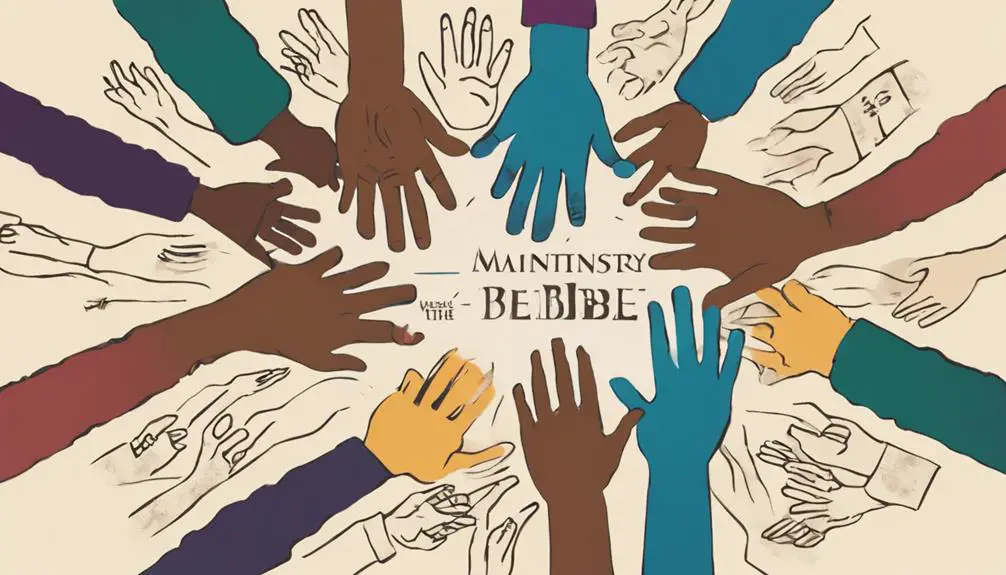Journey through the often overlooked, yet essential, Helps Ministry in the Bible, and discover its enduring impact on the Church today.

Helps Ministry in the Bible
Like a hidden gem in a treasure chest, the 'Helps Ministry' in the Bible is often overlooked, yet it holds significant value.
You might be intrigued by how it serves as the backbone to many church activities and functions, acting as the silent force that keeps things running smoothly.
But what is it, really? What does it entail and how does it echo through the ages to impact the Church today?
Let's embark on this enlightening journey together, and you might just uncover a new perspective on this humble, yet essential ministry.
Key Takeaways
- Helps Ministry, derived from 'Antilepsis', is a fundamental biblical service promoting unity and faith within Christian communities.
- The Bible highlights Helps Ministry as a spiritual gift, emphasizing support, selflessness, and bearing each other's burdens.
- Roles within Helps Ministry, such as prayer warriors and counselors, contribute to the church's vitality and require training for effective service.
- Helps Ministry, often unseen, is vital for church growth, fostering inclusivity, unity, and support for ministry leaders.
Understanding the 'Helps Ministry

While it might seem obscure to some, the 'Helps Ministry' is a fundamental part of biblical service, serving as a support system for the church and contributing significantly to its overall functionality and growth. The roots of 'Helps Ministry' originate from the early Christian communities, where everyone was called upon for service, with the goal of reinforcing faith and fostering unity.
Diving into the etymology, 'Helps' in the biblical context doesn't merely denote providing assistance. Instead, it embodies a much deeper commitment. Defining 'Helps' Biblically, it's derived from the Greek word 'Antilepsis', which translates to 'to lay hold of so as to support'. Thus, it implies a proactive role in supporting the church and its members, not just passively helping.
'Helps Ministry', therefore, isn't a peripheral aspect of service but rather an integral pillar of the Church's foundation. Its origins underscore the necessity of collective effort in the growth of the Church, while its biblical definition underscores the proactive and supportive roles that each member should play. Understanding this helps you appreciate the depth of commitment required in the 'Helps Ministry'.
Biblical References to 'Helps

To fully grasp the significance of the 'Helps Ministry', it's essential to delve into specific biblical references where the concept has been mentioned or implied. One pivotal verse is 1 Corinthians 12:28, where the Apostle Paul lists 'helps' as one of the spiritual gifts within the Church. This 'Helps' origin story provides an insight into its divine institution and significance.
The term 'helps' in this context implies assistance, support, and service to others to promote their well-being and spiritual growth. It's an act of selfless giving, a cornerstone principle in Christianity. This is further emphasized in Galatians 6:2, where believers are urged to bear one another's burdens, thus fulfilling the law of Christ.
The prophetic dimension of 'Helps' can be seen in the Book of Isaiah 41:13, where God promises to help His people. This 'Helps' in prophecies signifies the divine promise of assistance, underscoring the ideal that God's people are never alone but are continuously supported by His divine help.
Thus, the 'Helps Ministry' is deeply rooted in scriptural teachings, highlighting the importance of service in the Christian faith.
Roles Within the Helps Ministry

In the Helps Ministry, your role can take on various forms, all aimed at providing assistance and support to others within the Christian community. Whether you're a prayer warrior, a counselor, a teacher, or an administrator, you're an integral part of this ministry. Each role has unique duties and responsibilities that contribute to the overall health and vitality of the church.
Helps Ministry Training is essential for defining these roles. It equips you with the necessary skills, knowledge, and spiritual discernment to effectively minister to others. This training ensures you understand your role's expectations, whether it's offering pastoral care, organizing events, or teaching Bible studies.
Moreover, the concept of Ministry Partnership becomes crucial in this context. As a part of the Helps Ministry, you're not working alone. You're collaborating with others in a partnership, united by a common purpose – to serve God and His people. This partnership fosters a sense of community, enhancing the effectiveness of the ministry. It also promotes mutual encouragement and accountability, which are critical for maintaining spiritual resilience in service.
Practical Applications Today

Building upon these foundational principles of Helps Ministry, let's explore how you can apply them in today's context, making your service more effective and impactful. You might encounter modern challenges in the Helps Ministry, such as increased societal complexities and the rise of digital distractions. However, these challenges also offer opportunities for growth and innovation.
A key strategy to navigate these modern challenges is to effectively utilize technology in the Helps Ministry. With the advent of digital platforms, you have the opportunity to reach and serve more people. For instance, virtual meetings and online resources can supplement traditional face-to-face interactions, making your ministry more accessible and flexible. Social media platforms can also be utilized for outreach, building community, and fostering engagement.
Moreover, technology can facilitate administrative tasks, such as tracking donations, scheduling volunteers, or maintaining communication among team members. This can free up more time for you to focus on the core tasks of your ministry- serving others and spreading the Gospel.
The Impact and Importance of Helps

Understanding the impact and importance of Helps in the ministry offers insights into how this function can significantly shape a community's spiritual growth and cohesion. The 'Helps' influence, when properly harnessed, can inspire unity, foster spiritual maturity, and facilitate the smooth functioning of the church's operations.
You'll find that the role of Helps in ministry support is paramount. It's a direct response to the biblical call to serve one another in love. By offering practical assistance, Helps frees up ministry leaders to focus on their primary responsibilities such as teaching, praying, and guiding the flock. It's like the backbone that upholds the body, often unseen but indispensable.
Furthermore, Helps fosters a sense of belonging among members. It encourages participation, as everyone can contribute, regardless of their spiritual gifts. This inclusivity can significantly boost morale and unity within the congregation.
Frequently Asked Questions
What Are the Best Ways to Get Involved in the Helps Ministry?
You're looking to participate, right? Start with 'Helps Ministry Training'. It's crucial to understand this field's nuances.
Next, consider 'Ministry Volunteer Recruitment'. Organizations always need volunteers. You can offer your skills, time, and passion. Remember, it's not just about jumping in, it's about being equipped and committed. So, learn first, then volunteer.
It's a rewarding journey, providing both personal growth and the chance to make a substantial difference.
How Does the Helps Ministry Differ From Other Ministries in the Church?
The Helps Ministry's impact differs from other church ministries due to its unique focus on service and support. Unlike preaching or teaching ministries, your role in Helps is often behind the scenes, providing practical aid. It's about showing God's love through action, not just words.
Despite its less visible nature, don't underestimate its importance. Biblical references, like 1 Corinthians 12:28, highlight its key role in the church body.
Can the Principles of Helps Ministry Be Applied Outside the Church Context?
Absolutely, you can apply the principles of Helps Ministry in non-religious contexts like business and education. It's about aiding and supporting others, isn't it?
In business, you could use it to foster teamwork and improve customer service.
In education, it could enhance student-teacher collaboration and peer learning.
How Can I Encourage Others to Participate in the Helps Ministry?
You can encourage others to participate in the ministry by using motivational techniques. Show them the benefits they'll gain from being involved. Share success stories and the impact it's had on others. Provide them with a clear understanding of the role they'll play and the difference they'll make.
What Are the Challenges Faced by People Serving in the Helps Ministry and How Can They Overcome Them?
In serving in any volunteer role, you'll face challenges. Personal sacrifices such as time and energy are common. You might feel overwhelmed or underappreciated. However, you can overcome these issues.
Prioritize your tasks and find balance. Remember, every sacrifice contributes to your spiritual growth. Seek support from others in the ministry, share your experiences, and don't hesitate to ask for help.
It's a journey of learning, serving, and growing.
Conclusion
So, you've now delved into the 'Helps Ministry' within the Bible. You've seen its biblical references, understood its roles, and discovered its modern applications.
Remember, the impact of this ministry is profound, fostering unity, and enhancing the Body of Christ. It's clear the 'Helps Ministry' isn't a secondary role, but a vital component to the church's functionality.
The 'Helps Ministry' truly signifies service in its purest form. Embrace it, for it's essential in faith's journey.



Sign up